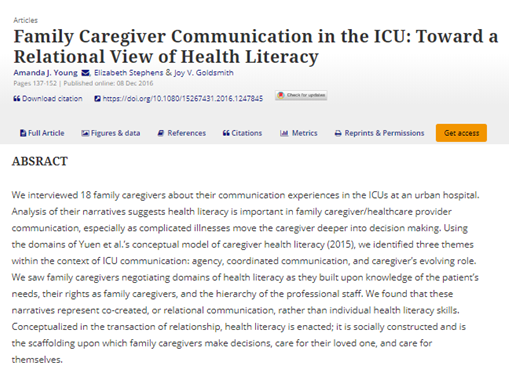Evidence Based Practice Assignment: Family Caregivers’ Health Literacy
Question
Task:
Prepare evidence based practice assignment on the below answerable question and critically justify the application of EBP process in a practice situation considering the various nursing databases:
“What are the factors that affect family caregivers’ health literacy in elderly people?”
Answer
What are the factors that affect family caregivers’ health literacy in elderly people?
Justification of application of EBP process
This answerable question based on the case scenario of evidence based practice assignment is mainly emphasizing upon the importance of health literacy in healthcare practice. For older adults, not only the health care professionals are involved in care procedure; rather, the family carers are also engaged. Thus, it is crucial for the family caregivers to have enough literacy about the health issue the older person is experiencing. This is why, this subject is crucial for clinical practice (Linville et al., 2018). However, several factors could hinder or influence the health literacy of family carers, which needs to be identified initially, so that these could be eliminated at very beginning also. As the health outcomes of the older adult are associated with the procedure, the topic explored in the evidence based practice assignment is important in terms of clinical health and safety also. Additionally, following the EBP process, the family caregiver could gain enough knowledge to provide the best quality care to the older adult, contributing to his / her better health outcomes (Ellis, 2019). The evidence based practice is important as the main purpose of the approach is to offer the best possible care available, which could address the maximum needs of the patient and could improve the overall health outcomes of the patients. Patients always look forward to get effective care, which is based on the best available evidences (Wittenberg, Goldsmith & Kerr 2019). This is why evidence based practice has been considered as one of the crucial approach in nursing. Further, in case of the current answerable question explored in the evidence based practice assignment, the key focus is upon improving the health and wellbeing of the older adults, who are considered as a vulnerable group in healthcare, prone to have comorbidities and risk of health issues (Young, Stephens & Goldsmith, 2017). If the family carers of these elderly people could find the most relevant evidences regarding the best care approaches, which have already shown significant positive impact on elderly health, they could assure that the elderly population could be saved from hazardous conditions at home. As a result, their possibility of hospital admission would also be reduced, while reducing the healthcare as well as financial burden (LoBiondo-Wood & Haber, 2017).
Answerable question breakdown
It is necessary to identify a suitable logical framework, for developing a suitable answerable question. In this context of evidence based practice assignment, the PIO framework has been selected here for logical breakdown of the answerable question (Eriksen & Frandsen, 2018).
P – Patient / participant – Carers of elderly people
I – Intervention – Health literacy
O – Outcome – Improved / Deteriorated care towards elderly people
Search Strategy protocol
Systematic review of literature is a procedure for searching appropriate articles and reviewing those in a consisting manner, following article appraisal method. It further helped to ensure that the research is going through a systematic manner, including authentic and evidenced based data, upon which one can rely. In order to do this, the researcher has to follow a proper format of literature search, which can be a framework or tool. In this current context, it is noteworthy that the literature search has been done in a systematic manner, ensuring it as evidence based practice. In this context of evidence based practice assignment, the assistance of search planner has been taken, which is a tool, helps researcher to conduct the literature search in a systematic manner. The initial step in the search protocol is to identify the key search terms, which can be used for identifying the most appropriate research articles, for answering the research question. The main research question for this literature search illustrated in the evidence based practice assignment is emphasizing upon the factors affecting the health literacy of family caregivers of older adults. In this context, the key search terms, which have been identified for the current search, are: “health literacy, family caregivers, older adults, factors affecting health literacy” (Wittenberg, Goldsmith & Kerr, 2019). Considering the primary key terms, the secondary key search terms have been used by joining these with Boolean. After this step, most authentic online databases have been selected for finding right articles. Understanding the significance, three online databases have been used for searching articles, which are “CINHAL full text plus, Joanna Briggs Institute and Cochrane library”.
The search terms have been used for getting articles for the answerable question. Initially, 200 articles were found, using the search terms on these databases. In the next step, these articles have been screened for duplicate copies. Eliminating those, 96 articles were found to be suitable. In the next step, articles were analyzed for their eligibility, with the help of inclusion criteria. The inclusion criteria included “1) published in English language; 2) published within last 7 years till date; 3) having accessibility of full text; 4) published with clear abstract”. After the assessment, 32 articles were found to be suitable for this research on evidence based practice assignment. Finally, these abstracts of these articles have been appraised for understanding their suitability of the study. Finally, 10 most appropriate articles have been identified and included in the study; review of these would help to answer the selected research question described above (Mourão et al., 2017). Although the task is difficult, as the research question involves more than one variable, making it a complex research, different articles emphasizing upon different variables of the research has been identified and included in the research, so that the research question could be answered overall. The 10 selected articles for the research on evidence based practice assignment has been listed in the appendix.
|
Stages of Research |
Articles includes |
Criteria for selection |
|
Identification |
200 |
Match with search terms, found in selected database |
|
Screening |
96 |
No duplicates or incomplete articles |
|
Eligibility |
32 |
Match with inclusion criteria |
|
Included |
10 |
Abstracts appraised, found suitable for answerable question |
Search Result
Emphasizing upon evidenced-based practice, mainly the literature search identified some articles identifying the importance of health literacy of family care givers of older adults and the factors, which can affect it. One article based on the case of evidence based practice assignment indicated that it is crucial factor for ensuring overall health and wellbeing of older adults, as they mostly experience comorbidities and health literacy of caregivers in their families improve their care procedures, behavior and adherence of the older adults towards care procedures (Young, Stephens& Goldsmith, 2017). In this context of evidence based practice assignment, it is noteworthy in some articles that some demographic factors, including socio-economic factors and educational level can affect the health literacy of the family caregivers significantly. Further, it is also noteworthy that the family caregivers of the older adults also needs to ensure that they have enough accessibility of health literacy and related materials for improving their health literacy, which further shapes their attitude and quality of care procedures for the older adults. It is also found herein evidence based practice assignment that the healthcare professional’s attitude, communication and its type can also affect the health literacy of the older adults significantly (Dawson et al., 2017).
Reference List
Chen, L., Xiao, L. D., & De Bellis, A. (2016). First?time stroke survivors and caregivers’ perceptions of being engaged in rehabilitation. Evidence based practice of root canal treatement cost assignment Journal of advanced nursing, 72(1), 73-84.
Dawson, S., Gerace, A., Muir-Cochrane, E., O'Kane, D., Henderson, J., Lawn, S., & Fuller, J. (2017). Carers' experiences of accessing and navigating mental health care for older people in a rural area in Australia. Aging & mental health, 21(2), 216-223.
Ellis, P. (2019). Evidence-based practice in nursing. Learning Matters.
Eriksen, M. B., & Frandsen, T. F. (2018). The impact of patient, intervention, comparison, outcome (PICO) as a search strategy tool on literature search quality: a systematic review. Journal of the Medical Library Association: JMLA, 106(4), 420.
Linville, D., Savercool, V., Barrera, S., Mintz, B., & Shune, S. (2018). Qualitative perspectives on a family group intervention program for improving physical wellness. Journal of Family Psychotherapy, 29(3), 252-273.
LoBiondo-Wood, G., & Haber, J. (2017). Nursing research-E-book: methods and critical appraisal for evidence-based practice. Elsevier Health Sciences.
Mourão, E., Kalinowski, M., Murta, L., Mendes, E., & Wohlin, C. (2017, November). Investigating the use of a hybrid search strategy for systematic reviews. In 2017 ACM/IEEE International Symposium on Empirical Software Engineering and Measurement (ESEM) (pp. 193-198). Evidence based practice assignment IEEE.
Protheroe, J., Whittle, R., Bartlam, B., Estacio, E. V., Clark, L., & Kurth, J. (2017). Health literacy, associated lifestyle and demographic factors in adult population of an English city: a cross?sectional survey. Health Expectations, 20(1), 112-119.
Radhakrishnan, K., Saxena, S., Jillapalli, R., Jang, Y., & Kim, M. (2017). Barriers to and Facilitators of South Asian Indian?Americans’ Engagement in Advanced Care Planning Behaviors. Journal of Nursing Scholarship, 49(3), 294-302.
Salehi, A., Frommolt, V., & Coyne, E. (2019). Factors affecting provision of care services for patients with cancer living in the rural area: An integrative review. The Australian Journal of Cancer Nursing, 20(1), 3-13.
Wittenberg, E., Goldsmith, J. V., & Kerr, A. M. (2019). Variation in health literacy among family caregiver communication types. Psycho?Oncology, 28(11), 2181-2187.
Wittenberg, E., Goldsmith, J., Ferrell, B., & Ragan, S. L. (2017). Promoting improved family caregiver health literacy: evaluation of caregiver communication resources. Psycho?oncology, 26(7), 935-942.
Wittenberg, E., Goldsmith, J., Ferrell, B., & Ragan, S. L. (2017). Promoting improved family caregiver health literacy: evaluation of caregiver communication resources. Evidence based practice assignment Psycho?oncology, 26(7), 935-942.
Young, A. J., Stephens, E., & Goldsmith, J. V. (2017). Family caregiver communication in the ICU: Toward a relational view of health literacy. Journal of Family Communication, 17(2), 137-152.
Appendix A
List of Literatures
|
Author |
Title |
Year of publication |
|
Young, Amanda J.; Stephens, Elizabeth; Goldsmith, Joy V. |
Family Caregiver Communication in the ICU: Toward a Relational View of Health Literacy |
2017 |
|
Dawson, S., Gerace, A., Muir-Cochrane, E., O'Kane, D., Henderson, J., Lawn, S., & Fuller, J.. |
Carers' experiences of accessing and navigating mental health care for older people in a rural area in Australia |
2017 |
|
Radhakrishnan, K., Saxena, S., Jillapalli, R., Jang, Y., & Kim, M.. |
Barriers to and Facilitators of South Asian Indian?Americans’ Engagement in Advanced Care Planning Behaviors |
2017 |
|
Wittenberg, E., Goldsmith, J. V., & Kerr, A. M.. |
Variation in health literacy among family caregiver communication types |
2019 |
|
Wittenberg, E., Goldsmith, J., Ferrell, B., & Ragan, S. L. |
Promoting improved family caregiver health literacy: evaluation of caregiver communication resources |
2017 |
|
Linville, D., Savercool, V., Barrera, S., Mintz, B., & Shune, S. |
Qualitative perspectives on a family group intervention program for improving physical wellness |
2018 |
|
Chen, L., Xiao, L. D., & De Bellis, A. |
First?time stroke survivors and caregivers’ perceptions of being engaged in rehabilitation |
2016 |
|
Salehi, A., Frommolt, V., & Coyne, E. |
Factors affecting provision of care services for patients with cancer living in the rural area: An integrative review |
2019 |
|
Wittenberg, E., Goldsmith, J., Ferrell, B., & Ragan, S. L. |
Promoting improved family caregiver health literacy: evaluation of caregiver communication resources |
2017 |
|
Protheroe, J., Whittle, R., Bartlam, B., Estacio, E. V., Clark, L., & Kurth, J. |
Health literacy, associated lifestyle and demographic factors in adult population of an English city: a cross?sectional survey |
2017 |
Appendix B
Articles
1)
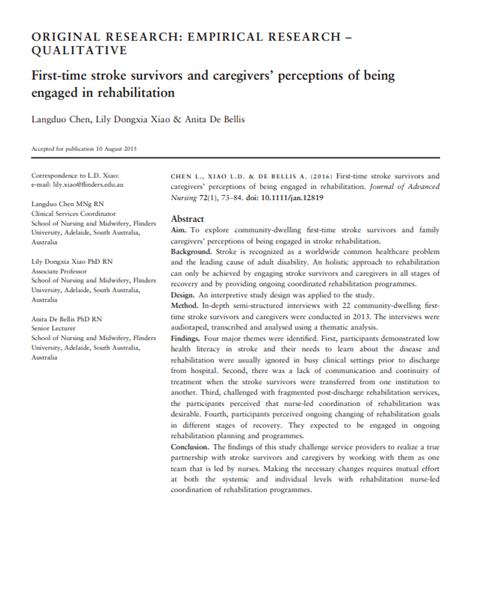
2)
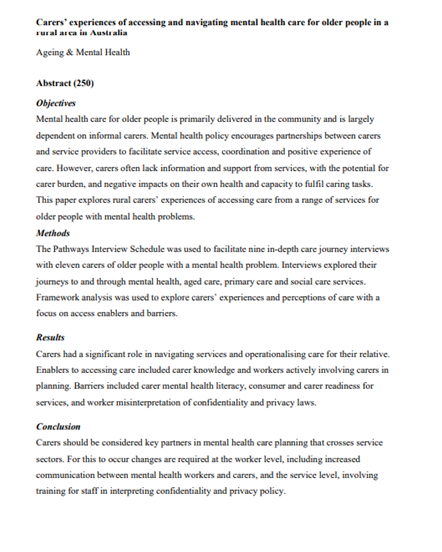
3)
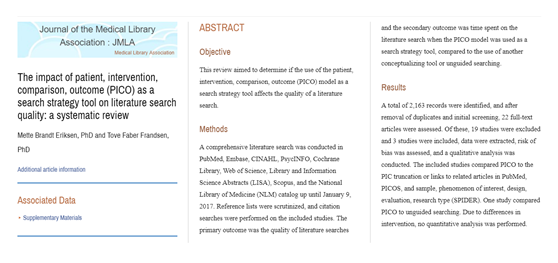
4)
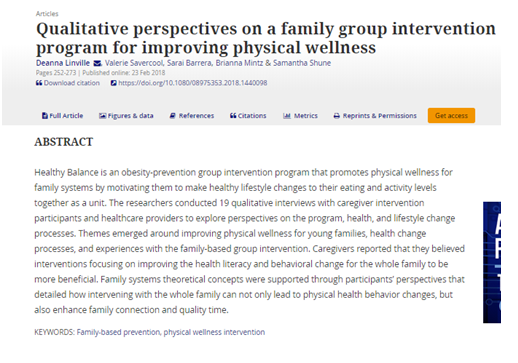
5)
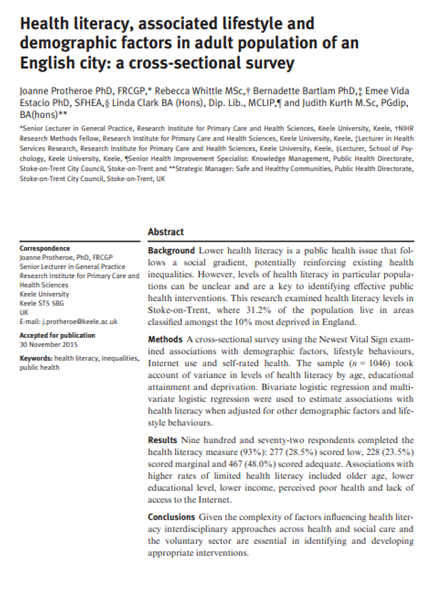
6)
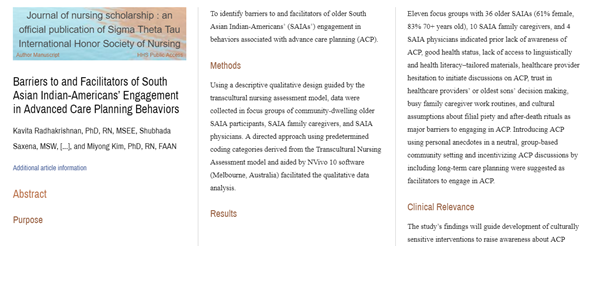
7)
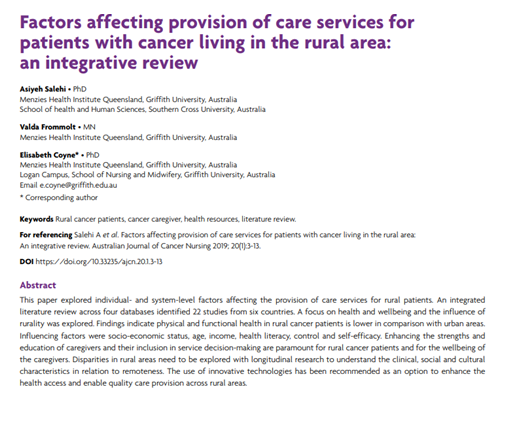
8)
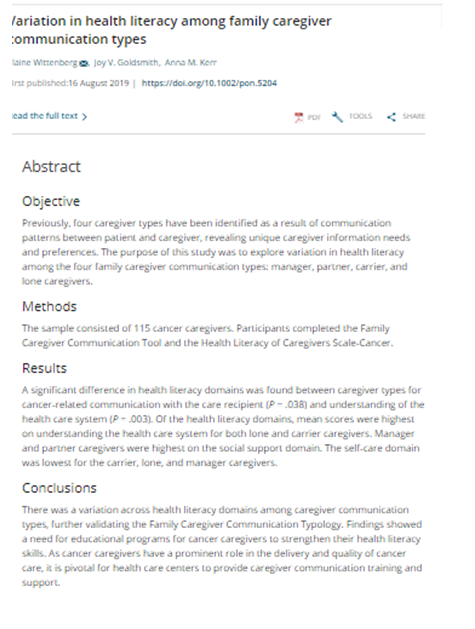
9)
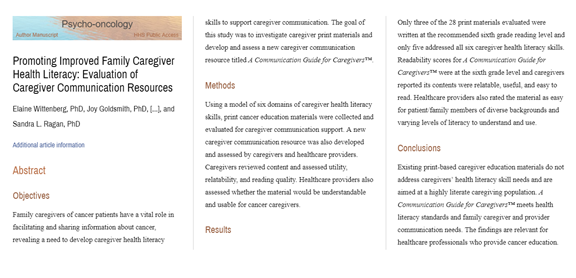
10)
